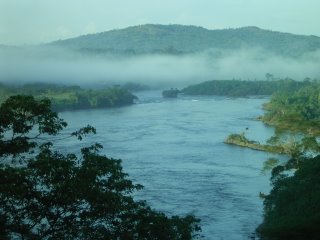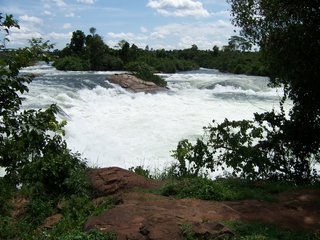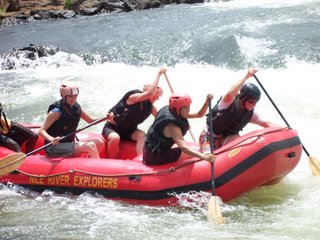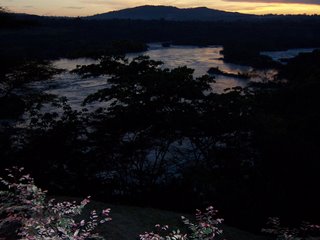Kenya Tour Winds Down With Earth Day
April 28, 2006. Friday, 3:31pm.
I just made the most amazing fried rice ever. I say that every time I make fried rice, so maybe by the time I leave here I will be cooking award-winning fried rice. Today was yellow squash fried rice, using squash and green onions fresh from my shamba. Fry up and salt to taste: yellow squash, dried fried onions (thanks Mom!), green onions, 1 egg (fresh from my chicken’s arse, sans bird flu), soy sauce. Peace Corps is an exercise in how to cook vegetarian when your mindset is that you haven’t really eaten unless your food has meat in it. I once saw this t-shirt that said: I’m a vegetarian not because I love animals, but because I hate vegetables. And my favorite quote from our technical trainer, Kibet: I’m a nyamatarian. (Nyama = meat).
Anyway, I’m finally winding down my two-month unintentional tour of Kenya, at least for now. It was hard readjusting to the relative isolation of life in the village when I got home yesterday afternoon, especially because I don’t have any plans to leave my site for another month. It’s a weird duality of experiences here. With other volunteers and ex-pats my social nature comes out, and in the village I like to be a creature of solitude once the sun goes down and everyone retreats into the safety of their own homes.
But after this last trip I had a hard time switching back to site rat life - cooking quietly at home, weeding contentedly in the shamba, rating songs on my iTunes playlists, curling up under a blanket in fuzzy pajamas to read about the wild parrots of Telegraph Hill (thanks Lynn!). I managed to do all those things but I missed having people around. With the right group of PCVs we always manage to have engaging conversations about African politics, racial diversity in America, tribalism in Kenya, immigration, genocide, gender inequality, Burts Bees beauty products, Italian food, Chinese food, Thai food, Mexican food, the best chocolate in Kenya, Dave Chappelle, movies, Buddhism, and of course, the latest Peace Corps gossip. This last trip was only two days, to help Jen with her community’s Earth Day. Her supervisor had rounded up local environment and public health officers, politicians, and school kids to pick up trash in the town center and plant over 1,500 trees.
SMS to Lexie, from me: Need help w/chikn dance.its hand thing,wing thing,booty shake thing right?Words go:nuh nuh nuh nuh nuh nuh nuh.Anythn else?
To me, from Lexie: Yup that’s it! Kenyans love it!
Goal # 3 of the U.S. Peace Corps: To share knowledge and culture about Americans with host country communities.
A small group of PCVs met up in Jen’s village on Wednesday morning. We went to the D.O.’s office and joined like 300 primary school kids. As we stood around and chatted while the officials made preparations, the kids slowly creeped closer to us to get a better look at the mzungu freak show.
“It’s amazing how stealthy they are,” one of us observed.
“You can’t see them moving toward us, but next thing you know they’ve got us surrounded,” someone else noted.
“It’s kind of uncomfortable,” someone else said.
“OK EVERYONE! WANT TO LEARN THE CHICKEN DANCE?”
Like most lessons I’ve taught in Kenya, the first time around it was the wazungu making fools of ourselves to a crowd of students stunned into silence. They’re imitating chickens. But soon they warmed up to us, especially when we shook our booties as fast as we possibly could, and after a few rounds we even convinced one of the more enthusiastic boys to take over as the dance leader.
The festivities lasted all day and it was the most fun I’ve ever had picking up the most filthy trash I’ve ever seen in my life. A lot of the kids were picking up trash barefoot, and we had to tell one girl to leave a random pile of garbage where it was because it wasn’t going to fit into our bag. Of course, this being Kenya, the day ended with several riveting hours of boring speeches. It was after 3pm and we hadn’t had lunch yet. But we were on stage in the guest of honor section so we couldn’t excuse ourselves. Plus we wouldn’t be allowed to leave until we each had made a speech. The last speaker said, “The good thing about going last is that everyone has already said everything. The bad thing about going last is that I end up repeating what everyone has already said.” And then he proceeded to speak for another 15 minutes.
I just made the most amazing fried rice ever. I say that every time I make fried rice, so maybe by the time I leave here I will be cooking award-winning fried rice. Today was yellow squash fried rice, using squash and green onions fresh from my shamba. Fry up and salt to taste: yellow squash, dried fried onions (thanks Mom!), green onions, 1 egg (fresh from my chicken’s arse, sans bird flu), soy sauce. Peace Corps is an exercise in how to cook vegetarian when your mindset is that you haven’t really eaten unless your food has meat in it. I once saw this t-shirt that said: I’m a vegetarian not because I love animals, but because I hate vegetables. And my favorite quote from our technical trainer, Kibet: I’m a nyamatarian. (Nyama = meat).
Anyway, I’m finally winding down my two-month unintentional tour of Kenya, at least for now. It was hard readjusting to the relative isolation of life in the village when I got home yesterday afternoon, especially because I don’t have any plans to leave my site for another month. It’s a weird duality of experiences here. With other volunteers and ex-pats my social nature comes out, and in the village I like to be a creature of solitude once the sun goes down and everyone retreats into the safety of their own homes.
But after this last trip I had a hard time switching back to site rat life - cooking quietly at home, weeding contentedly in the shamba, rating songs on my iTunes playlists, curling up under a blanket in fuzzy pajamas to read about the wild parrots of Telegraph Hill (thanks Lynn!). I managed to do all those things but I missed having people around. With the right group of PCVs we always manage to have engaging conversations about African politics, racial diversity in America, tribalism in Kenya, immigration, genocide, gender inequality, Burts Bees beauty products, Italian food, Chinese food, Thai food, Mexican food, the best chocolate in Kenya, Dave Chappelle, movies, Buddhism, and of course, the latest Peace Corps gossip. This last trip was only two days, to help Jen with her community’s Earth Day. Her supervisor had rounded up local environment and public health officers, politicians, and school kids to pick up trash in the town center and plant over 1,500 trees.
SMS to Lexie, from me: Need help w/chikn dance.its hand thing,wing thing,booty shake thing right?Words go:nuh nuh nuh nuh nuh nuh nuh.Anythn else?
To me, from Lexie: Yup that’s it! Kenyans love it!
Goal # 3 of the U.S. Peace Corps: To share knowledge and culture about Americans with host country communities.
A small group of PCVs met up in Jen’s village on Wednesday morning. We went to the D.O.’s office and joined like 300 primary school kids. As we stood around and chatted while the officials made preparations, the kids slowly creeped closer to us to get a better look at the mzungu freak show.
“It’s amazing how stealthy they are,” one of us observed.
“You can’t see them moving toward us, but next thing you know they’ve got us surrounded,” someone else noted.
“It’s kind of uncomfortable,” someone else said.
“OK EVERYONE! WANT TO LEARN THE CHICKEN DANCE?”
Like most lessons I’ve taught in Kenya, the first time around it was the wazungu making fools of ourselves to a crowd of students stunned into silence. They’re imitating chickens. But soon they warmed up to us, especially when we shook our booties as fast as we possibly could, and after a few rounds we even convinced one of the more enthusiastic boys to take over as the dance leader.
The festivities lasted all day and it was the most fun I’ve ever had picking up the most filthy trash I’ve ever seen in my life. A lot of the kids were picking up trash barefoot, and we had to tell one girl to leave a random pile of garbage where it was because it wasn’t going to fit into our bag. Of course, this being Kenya, the day ended with several riveting hours of boring speeches. It was after 3pm and we hadn’t had lunch yet. But we were on stage in the guest of honor section so we couldn’t excuse ourselves. Plus we wouldn’t be allowed to leave until we each had made a speech. The last speaker said, “The good thing about going last is that everyone has already said everything. The bad thing about going last is that I end up repeating what everyone has already said.” And then he proceeded to speak for another 15 minutes.





